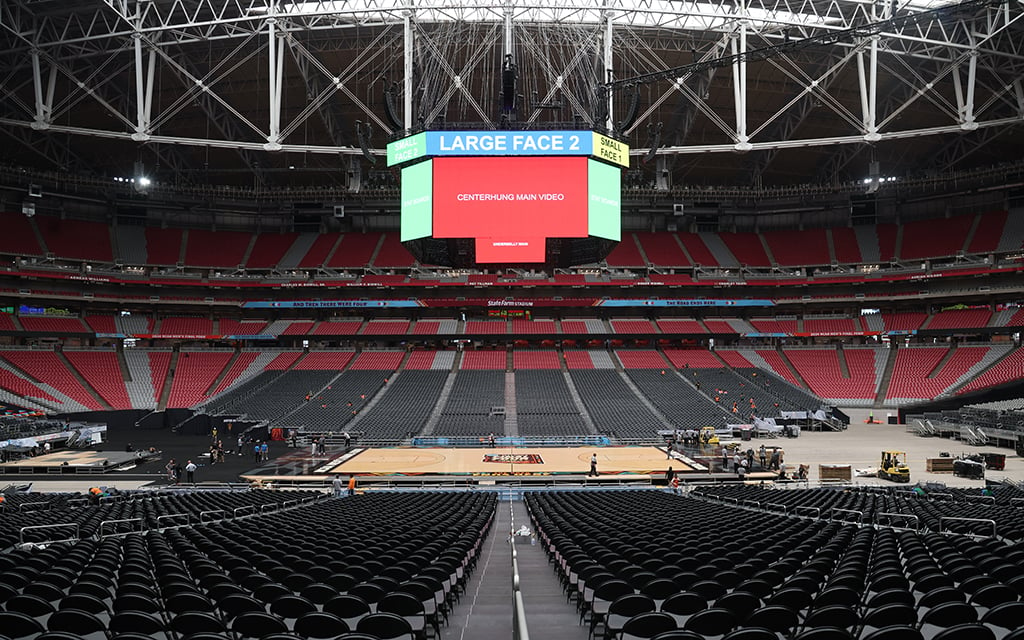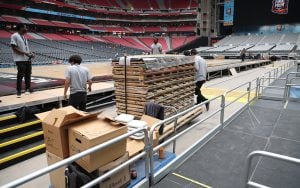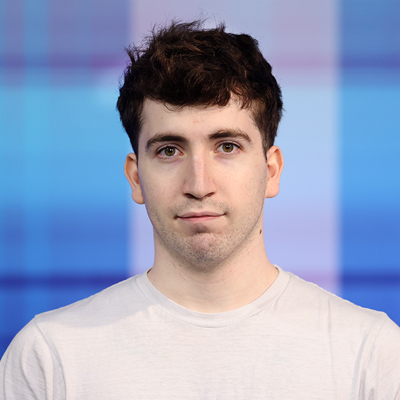
One challenge associated with constructing a basketball court in a football stadium is that it becomes necessary to build a stage for the court to sit on. (Photo by Joe Eigo/Cronkite News)
GLENDALE – One of the most important parts of Men’s Final Four preparation is complete.
On Friday morning, technicians from Connor Sports, in partnership with the State Farm Stadium crew, completed the installation of the court for this weekend big event.
“The Final Four is one of the biggest sporting events of the year,” said Andy Gorchov, general manager of State Farm Stadium. “We know the spotlight of the nation is going to be on the stadium and Arizona over the weekend.”
The impressive court is made from wood that is sustainably harvested. It is 70 feet by 140 feet, with panels weighing approximately 165 pounds each and 58,000 pounds in total. The assembly took an estimated four hours to complete.
Connor Sports has been one of the leading sports-flooring manufacturers in the country for the last 150 years and uses its experience to compose masterful hardwood creations.
The process behind creating the court began around nine months ago by procuring the wood and materials needed. Once the actual panels are created, they are shipped to Texas, where the graphics created by the NCAA are painted.
After arriving in Glendale on March 25, the court was pieced together using quick-lock technology, which ensures that there is no loose hardware by fusing the panels with a piece of strip iron.

The court for the Men’s Final Four is 70 feet by 140 feet, with panels weighing approximately 165 pounds each and 58,000 pounds in total. The assembly took an estimated four hours to complete. (Photo by Joe Eigo/Cronkite News)
One challenge associated with constructing a basketball court in a football stadium is that it becomes necessary to build essentially a stage for the court to sit on. This raised platform is made to safeguard players by giving more out-of-bounds space to chase loose balls and to provide a better viewing experience for those in the upper levels.
Installing the elevated court requires a collaborative effort. In addition to the State Farm Stadium employees and three representatives from Connor Sports who are overseeing the setup, there was a labor force pooled from the host city, in this case, Phoenix.
State Farm Stadium also works closely with Arizona State University, the host institution. ASU is tasked with handling game-management responsibilities.
On top of the on-site effort, 135 people from the Connor Sports company mill have been running both day and night shifts to make everything run smoothly.
So what happens to the court after the game ends and the stadium clears out?
“The winning team of men’s and women’s championships is given first right of refusal,” said Zach Riberdy, the marketing director for Connor Sports. “They have a predetermined set of time to purchase the whole court or part of the court, and after that period is up, the court goes up for open auction.”
In the past, Kanas added parts of its floor to the walls of the team’s practice facility, while Kentucky took the jump circle from its 2012 title game court and made it part of a locker room floor.
The expectation is that there will be an estimated 75,000 fans in attendance for the Final Four. To accommodate this many people, adjustments were made to the arena.
“A basketball court is smaller than the size of a football field and so you want to reduce the grade of the seats,” Gorchov said, “Thus, they build temporary seating that goes over the pre-existing lower bowl seats, allowing the seats to come more gradually down to the side of the court.”
On Friday, before the Final Four, the court will play host to a free-for-the-public event known as Reese’s Men’s Final Four. The event will showcase each of the regional winners as they have open practices. There will also be the NABC All-Star Game where the top senior student-athletes will compete against one another.

Arizona State is the host school for the upcoming Men’s Final Four and has been preparing for the event since it was awarded the competition. (Photo by Joe Eigo/Cronkite News)
There will also be a wide range of weekend festivities in the Phoenix area. There are four different events scheduled to enhance the fan experience: Final Four Fan Fest, March Madness Music Festival, Final Four Dribble, and Final Four Tip-Off Tailgate.
Most recently, in February 2023, the stadium played host to the Super Bowl between the Kansas City Chiefs and Philadelphia Eagles.
The last time Phoenix hosted the Final Four was in 2017 and featured North Carolina, Gonzaga, Oregon, and South Carolina, with UNC beating Gonzaga in the championship game.
The Phoenix metropolitan area hosts a variety of sporting events annually, including the Waste Management Phoenix Open, Cactus League spring training, and NASCAR races such as the NASCAR Cup Series Championship race.
There are also major plans for upcoming local events. It was recently announced by NBA Commissioner Adam Silver that the Footprint Center will host the NBA All-Star Game in 2027, marking the fourth time that Phoenix has hosted this event.
2024 will also feature the Guaranteed Rate Bowl, the WNBA All-Star Game, and the inaugural LPGA Ford Championship, which took place this past weekend.
Tune in on Saturday to see the court in action and watch as the Alabama Crimson Tide face off against the top-seeded Connecticut Huskies and the Purdue Boilermakers battle the upstart NC State Wolfpack.

